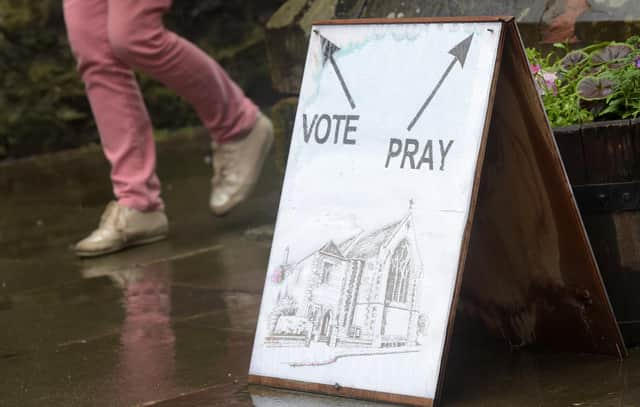Scottish Parliament should resist Boris Johnson's plans for voter ID – Dr Jess Garland


In Scotland nearly 1.5 million voters went unrepresented in the 2019 election, due to the one-party-takes-all voting system. Around a million potential Scottish voters are missing from the electoral roll. And each month seems to bring a new cronyism scandal, with donors seeking to buy political influence amid growing questions over government contracts.
But rather than tackle these issues, the government has launched new legislation that will take democracy further backwards. The new Elections Bill paves the way for laws that would require voters to show photographic identification before being able to vote.
Advertisement
Hide AdAdvertisement
Hide AdThe government’s own figures suggest roughly 2.1 million people could be unable to vote in a general election due to not having recognisable photo ID.
Many of those most likely to be affected include already marginalised groups in society.Last month the Electoral Commission warned that disadvantaged groups, including the unemployed, renters and disabled people, are less likely to have ID and risk being locked out of the ballot box.
Any change to Britain’s franchise needs careful consideration. But instead of providing evidence of the need for mandatory ID, the government claims there's an “unacceptable potential” for abuse at the moment.
Widespread voter fraud at the ballot box would be easy to see. We’d find hundreds of people turning up to vote on polling day to find a ballot had already been cast in their name. Those claims are almost non-existent.
Of the 595 alleged cases of electoral fraud investigated by the police in 2019, only 33 related to voter impersonation at a polling station – just 0.000057 per cent of over 58 million votes cast in all elections that year.
Most complaints about elections don’t relate to ordinary voters; they relate to party campaigners breaking the rules. Somehow the government seems more reluctant to clamp down on those actual abuses, instead choosing to clamp down on our independent elections watchdog and make it harder for people to vote.
Yet despite the clear risks of mandatory ID, and opposition from the SNP, Labour, Liberal Democrats and Conservatives like Ruth Davison and David Davis, the government looks set to force this dangerous policy on Scottish voters.
The new legislation was interestingly timed: it came days before the Committee on the Standards of Public Life (CSPL), the Prime Minister’s independent standards watchdog, launched its long-anticipated report on Britain’s outdated elections laws. It’s disappointing that instead of reflecting on the report, ministers jumped the gun and rushed out their own proposals instead.
Advertisement
Hide AdAdvertisement
Hide AdIn their report, the CSPL warned election rules need to be updated to keep track of the changing nature of online campaigning and rightly so. As the ERS has long noted, our election laws are woefully out of date with the lack of regulation on digital campaigning posing a real threat to the security of democracy in the UK.
So instead of fear-mongering over a handful of allegations, ministers should tackle the real threats to democracy: the vulnerabilities in the current system that leave our elections open to dark money and foreign interference through online ads and third-party campaigns.
Holyrood should do all it can to resist these dangerous plans.
Dr Jess Garland, director of policy and research, Electoral Reform Society
A message from the Editor:
Thank you for reading this article. We're more reliant on your support than ever as the shift in consumer habits brought about by coronavirus impacts our advertisers.
If you haven't already, please consider supporting our trusted, fact-checked journalism by taking out a digital subscription.
Comments
Want to join the conversation? Please or to comment on this article.
